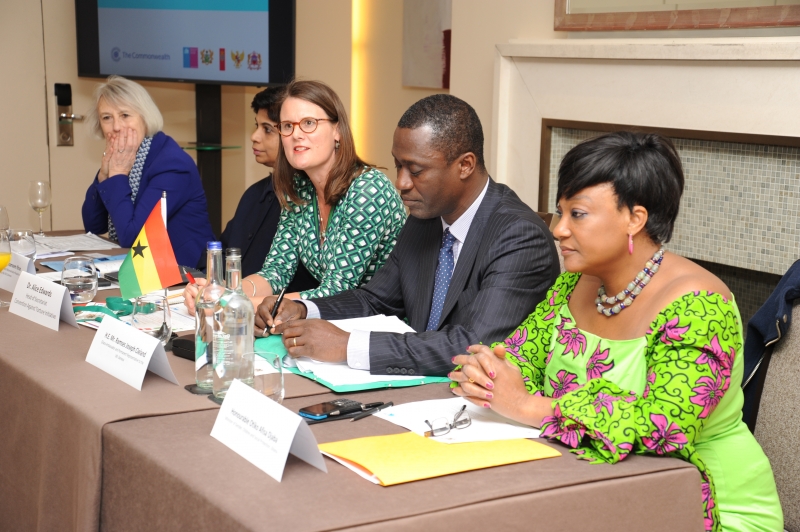Evening discussion galvanises solidarity for Commonwealth States to ratify UNCAT
Tuesday 17 April, London: As part of the summit for the Commonwealth Heads of Government Meeting (CHOGM), CTI took the opportunity to convene an evening discussion focusing on the rule of law, justice sector reform and the UN Convention against Torture, with reflections on good practices as well as challenges in Fiji, Ghana and the United Kingdom to prevent and eradicate ill-treatment. As 19 of the 32 States that have yet to ratify the Convention are members of the Commonwealth, the event called for greater exchanges within Commonwealth countries to learn and share experiences and positive practices.

In her opening remarks, the Honourable Otiko Afisa Djaba, Minister of Gender, Children and Social Protection of Ghana, stressed that Commonwealth States share the goals of the Commonwealth Charter, of building strong and stable countries built on democracy, good governance, human rights and the rule of law. She noted that “The UN Convention against Torture is one of the key international human rights treaties that fosters fair systems for the administration of justice, that reduces some of the worst excesses by government officials, sustains development and supports strong economies.” She added, “In this regard, we have some work to do. For its part, the CTI has been working closely with many Commonwealth countries over the last few years, on a bilateral and regional basis, also at times in collaboration with the Commonwealth Secretariat and the UN.”
The three panellists were H.E. Ms. Nazhat Shameem Khan, Fiji’s Ambassador to the UN in Geneva, H.E. Mr. Ramses Joseph Cleland, Ghana’s Ambassador to the UN in Geneva, and Dame Anne Owers, National Chair of Independent Monitoring Boards, UK. This event gathered a number of delegations attending CHOGM, heads and representatives of diplomatic missions in London, UK-based human rights organisations as well as CTI Friends and experts.
Ambassador Khan, previously a prosecutor and a judge in her own country, mentioned how the Universal Periodic Review process had provided an opportunity for Fiji to look at its practices and she said the right question they asked themselves was, “Why wouldn’t we ratify UNCAT?.” Ratification, she said, “has led to a wonderful development in Fiji, that of greater cohesion in the criminal justice system between police, the prosecution service and judges, and greater transparency overall.”
Ambassador Ramses Joseph Cleland shared some of the reasons why Ghana had ratified not only UNCAT but also the Optional Protocol to the Convention against Torture, the latter in September 2016. He listed a number of the important breakthroughs resulting from the recent prison reforms, propelled by Ghana’s ratification of OPCAT as well as a visit of the former UN Special Rapporteur on Torture, Mr. Juan Mendez. He mentioned that Ghana has constructed a new prison, bolstered its training programme for prison staff, introduced procedures to ensure that prisoners are aware of their rights upon admission, and registered all prisoners in the Ghanaian health care system. Ambassador Cleland noted that in order to reduce prison over-crowding, Ghana has introduced in-prison court sittings (the “Justice for All” programme) which has reduced overcrowding in pre-trail detention in particular. “Since its inception in 2007, the programme has reduced pre-trial populations in Ghana’s prisons from a rate of 30.6% to 14.1% in 2018.” he said.
Dame Anne Owers shared a number of results-positive practices that have been developed in the UK around independent monitoring of both police and places of detention, noting that since their introduction deaths in custody have been halved. She also emphasised that monitoring was most effective when it was not only independent, but also had the buy-in and cooperation of the service itself. She compared it to running a business, “If you ran a business, you would treat complaints as really important management information.”
All speakers mentioned continuing challenges, whether that was around attitudinal changes in police, access to lawyers, overcrowding in prisons, or lack of training for officials.
The event was co-organised with the Ghanaian High Commissions in London and Geneva, and with the support of the Commonwealth Secretariat. The panel was chaired by Dr. Alice Edwards, Head of the CTI Secretariat, and closed by Mr. Steve Onwuasoanya, Human Rights Adviser at the Commowealth Secretariat.

